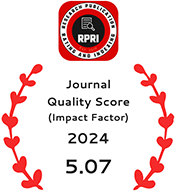Strategic Analysis of Agriculture Students’ Employability by SWOT Technic
DOI:
https://doi.org/10.55544/jrasb.2.3.13Keywords:
Employability skills, SWOT, Agricultural studentAbstract
Without a doubt, having a high education will help you land a good career, but employers demand more from their workforce to benefit their business. The job market is tough these days. Employees that want to be competitive must possess a variety of employability skills. The primary goal of this study is to show the employability skills required of graduates in agriculture. The study site was at Iran's Bu-Ali-Sina University's Faculty of Agriculture in Hamadan province. There were 45 participants in the study; of these, 15 were lecturers, 15 were employers, and 15 were B.Sc. and M.Sc.-level students. Based on the result of the SWOT analysis strategy for agricultural students' employability are include “Prepare suitable work environment for students to gain work experience”, “before entering the job market, Holding entrepreneurial conferences and seminars to encourage entrepreneurs and explain government support for entrepreneurship”, “also giving government facility and support their new business”, “Increasing practical lessons than theoretical”, “and providing capital for starting a new business”, “To avoid a mental problem student should be chosen according to their interest field”, “and Increasing government funding to provide job opportunity for new graduates youths.”
Downloads
Metrics
References
Aiyelaagbe, I. O. O., Harris, P. J. C., & Olowe, V. I. O. (2016). Skills gaps in organic agriculture and SWOT analysis in higher educational institutions (HEIs) in Anglophone West Africa. Organic Agriculture, 6(2), 109–118. https://doi.org/10.1007/s13165-015-0119-1
Alibaygi, A. H., Barani, S., Karamidehkordi, E., & Pouya, M. (2013). Employability determinants of senior agricultural students in Iran. Journal of Agricultural Science and Technology, 15(4), 673–683.
Buntat, Y., Jabor, M. K., Saud, M. S., Mansor, S. M. S. S., & Mustaffa, N. H. (2013). Employability Skills Element’s: Difference Perspective Between Teaching Staff and Employers Industrial in Malaysia. Procedia - Social and Behavioral Sciences, 93(1990), 1531–1535. https://doi.org/10.1016/j.sbspro.2013.10.077
Ismail, O., Jess, L.-D., Alseny, S., & Diawo, D. (2017). Employment Prospects for Agricultural Graduates in Guinea Conakry. Journal of Agricultural Extension and Rural Development, 9(1), 5–13. https://doi.org/10.5897/jaerd2016.0804
Kemp, S. (2009). Embedding employability and employer engagement into postgraduate teaching: a case study from ‘environmental management systems.’ Planet, 21(1), 47–52. https://doi.org/10.11120/plan.2009.00210047
Mirakzadeh, A. A., & Ghiasy, F. G. (2011). Effective factors on the employment status of agricultural graduates in Iran. African Journal of Agricultural Research, 6(2), 432–439. https://doi.org/10.5897/AJAR10.878
Ommani, A. R. (2010). Strengths, weaknesses, opportunities and threats (SWOT) analysis for farming system businesses management: Case of wheat farmers of Shadervan District , Shoushtar Township, Iran. African Journal of Business Management, 5(22),9448–9454. http://www.academicjournals.org/AJBM%0Ahttp://www.academicjournals.org/journal/AJBM/article-full-text-pdf/21F95E420498
Othman, H., Buntat, Y., Sulaiman, A., Salleh, B. M., & Herawan, T. (2010). Applied mathematics cans enhance employability skills through PBL. Procedia - Social and Behavioral Sciences, 8(5), 332–337. https://doi.org/10.1016/j.sbspro.2010.12.046
Radhakrishnan, M., & Sudha, S. (2015). Analysis of employability skills of undergraduate engineering students in view of employers perspectives. ARPN Journal of Engineering and Applied Sciences, 10(20), 9304–9308.
Rezvanfar, A., Ghorbanian, M., & Shafiee, F. (2014). An Investigation of the Behaviour of Agricultural Extension and Education Engineering Students in Tehran University Towards Employability. Procedia - Social and Behavioral Sciences, 152, 65–69. https://doi.org/10.1016/j.sbspro.2014.09.155
Sarfraz, I., Rajendran, D., Hewege, C., & Mohan, M. D. (2018). An exploration of global employability skills: A systematic research review. International Journal of Work Organisation and Emotion, 9(1), 63–88. https://doi.org/10.1504/IJWOE.2018.10012435
Sudrajat, J., Rahman, M. A., Sianturi, A., & Vendy. (2016). Entrepreneurship Learning Process. The WINNERS, 17(1), 67–75.
Yaghoubi, J. (2010). Study barriers to entrepreneurship promotion in agriculture higher education. Procedia - Social and Behavioral Sciences, 2(2), 1901–1905. https://doi.org/10.1016/j.sbspro.2010.03.1006
Downloads
Published
How to Cite
Issue
Section
License
Copyright (c) 2023 Saeedullah Shinwari, Asadullah Sadat, Yaser Mohammadi, Mohammad Sadiq Salihi

This work is licensed under a Creative Commons Attribution-NonCommercial-NoDerivatives 4.0 International License.


















